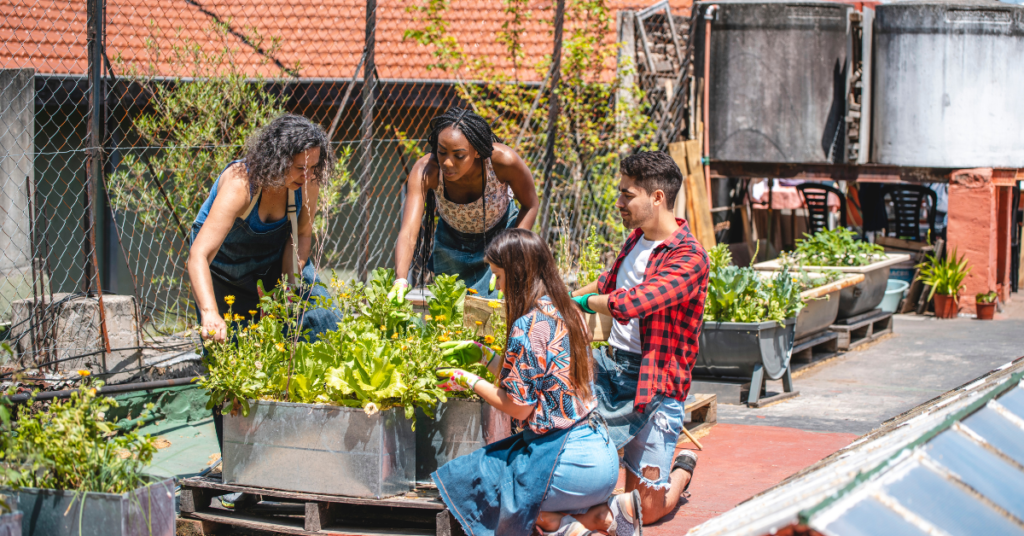As someone who has always enjoyed spending time outdoors and working with my hands, gardening has long been a favorite hobby of mine.
But it wasn’t until I started experiencing high levels of stress and anxiety that I realized the mental health benefits gardening could offer.
I’ll explore why gardening is an excellent stress reliever and how it can improve overall mental well-being.
Introduction to gardening as a stress-reliever

Gardening is a great way to connect with nature and get some exercise, but it’s also an effective tool for reducing stress and anxiety.
Psychologists suggest that gardening can lower cortisol levels, which is a hormone that’s associated with stress. This indicates that gardening directly impacts the body’s stress response system.
One reason gardening is such a powerful stress reliever that it allows individuals to disconnect from the distractions of modern life and focus on a single task.
When gardening, you’re forced to be present at the moment and pay attention to your surroundings. This can be incredibly grounding and calming, especially for those who struggle with racing thoughts or a sense of overwhelm.
The science behind gardening’s mental health benefits

While the stress-relieving effects of gardening are well-documented, researchers are still exploring the underlying mechanisms that make gardening so effective.
One theory is that gardening promotes neuroplasticity, the brain’s ability to adapt and change in response to new experiences.
A study published in the Journal of Physiological Anthropology found that individuals who participated in gardening had higher levels of brain-derived neurotrophic factor (BDNF). This protein supports the growth and survival of neurons.
This suggests that gardening can help promote the growth of new brain cells and improve overall cognitive function.
Gardening as a form of mindfulness and meditation

Another reason gardening is such an effective stress reliever that it can be a form of mindfulness and meditation.
When gardening, you’re fully immersed in the task at hand and focused on the present moment. This can be a powerful way to quiet the mind and reduce feelings of anxiety.
Gardening can be as practical as meditation in promoting mindfulness and reducing negative mood states.
This suggests that gardening can be a valuable tool for those who struggle with traditional meditation or are looking for a more active way to practice mindfulness.
Gardening and its impact on anxiety and depression

Anxiety and depression are two of the most common mental health disorders, and they can be incredibly debilitating for those who experience them.
While there are many effective treatments for anxiety and depression, gardening can be a powerful complementary therapy.
Gardening can reduce symptoms of depression and improve overall well-being. This may be partly because gardening promotes physical activity, which is known to improve mood and reduce symptoms of depression and anxiety.
The positive effects of gardening on cognitive function

In addition to its stress-relieving and mood-boosting effects, gardening has also improved cognitive function.
A study published in the Journal of Alzheimer’s Disease found that gardening can improve attention and memory function in older adults.
This may be partly because gardening requires individuals to use a range of cognitive skills, such as problem-solving, planning, and decision-making.
By engaging these skills regularly, individuals may improve their overall cognitive function and reduce their risk of cognitive decline.
How gardening can improve mood and overall well-being

One of the most powerful aspects of gardening is its ability to improve overall mood and well-being.
When gardening, you’re not just engaging in physical activity – you’re also creating something beautiful and nurturing new life.
This sense of purpose and accomplishment can be gratifying and help boost self-esteem and confidence.
Tips for incorporating gardening into your self-care routine
If you’re interested in using gardening as a tool for stress relief and mental well-being, you can do a few things to get started.
First, start small – even a small herb garden or a few potted plants can be a great way to get started without feeling overwhelmed.
You can also incorporate gardening into your self-care routine as a form of mindfulness and meditation. Take a few minutes each day to tend to your plants and focus on the present moment.
Finally, consider using gardening as a way to connect with others. For example, joining a community garden or volunteering at a local park can be a great way to meet new people and build social connections.
Creative ways to garden in small spaces

One common barrier to gardening is a lack of outdoor space, but there are many creative ways to garden, even in small apartments or homes.
Consider using vertical gardening techniques, such as hanging baskets or wall-mounted planters, to make the most of your available space.
You can also grow herbs or small plants in containers on your windowsill or balcony. If you have access to a community garden or park, consider renting a plot or volunteering to help with upkeep.
Community gardening and its impact on social connectedness

As I mentioned earlier, gardening can be a powerful way to connect with others and build social connections.
This is especially true in community gardening, which involves multiple individuals coming together to tend to a shared garden space.
Research has shown that community gardening can improve social connectedness and reduce feelings of isolation and loneliness.
Individuals can build a sense of purpose and belong by working together to create something beautiful and nurturing new life.
Parting Remarks on Gardening: Embracing gardening as a tool for mental health and well-being
Whether you have a backyard or just a windowsill, there are many ways to incorporate gardening into your self-care routine and reap the mental health benefits.
So, if you’re looking for a new way to reduce stress and improve mental well-being, I encourage you to try gardening.
Whether you’re a seasoned gardener or just starting, there’s no better time to embrace the power of gardening for mental health and well-being.
Start your gardening journey today by planting a small herb garden or joining a local community garden. Remember, even a few minutes of gardening each day can make a big difference in your overall mental well-being.

